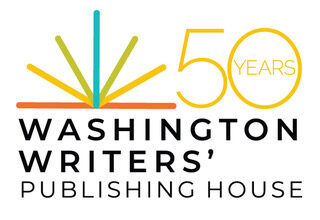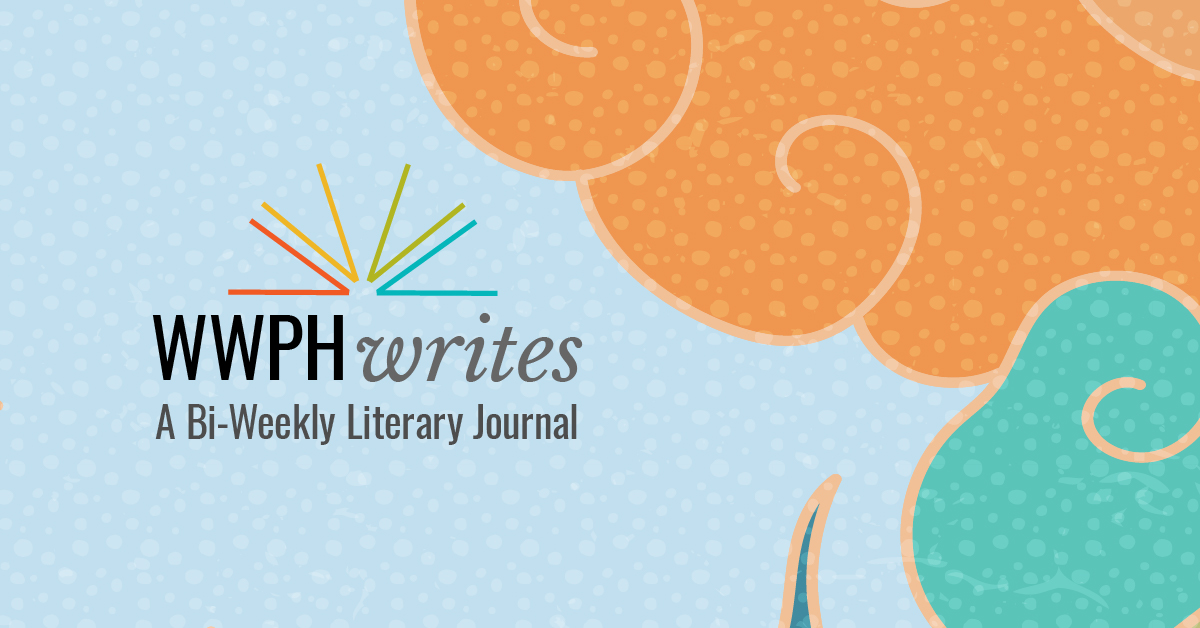WWPH Writes: Issue # 12

Issue #12
Dedicated to Poetry & Fiction Writers in the DMV
Welcome to Issue #12
In this season of ghosts, WWPH Writes issue #12 spotlights poet Sid Gold, whose Hebrew Home for the Aged is a tribute to his bedridden grandmother, like a dried fig, once a fiery Litvak seamstress hiding Anarchist pamphlets in pots. In Last Rites, Gold simultaneously embraces and eschews religious faith: my patron is a saint…urging me/ to do nothing, often, in his name. Both poems appear in Gold’s stunning 1997 collection, Working Vocabulary. In Calder’s Dog, excerpted from Elizabeth Bruce’s haunting 2007 novel, And Silent Left the Place, Great War veteran Thomas Riley creates his own tribute to a long-dead daughter. You can read the fascinating interview between Gold and Bruce on our News & Awards page, and find their gorgeous books, both newly republished this month, in our Bookshop.
Kathleen Wheaton, president and publisher, WWPH
WWPH Writes: Poetry
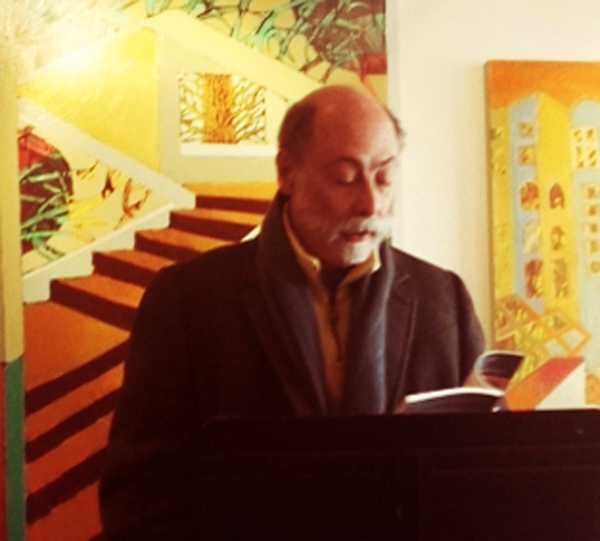
Sid Gold is the author of four collections of poetry, including Working Vocabulary (Washington Writers’ Publishing House, ’97 & ’21) and Crooked Speech (Pond Road Press, ’18). He is a two-time recipient of a Maryland State Arts Council Individual Artist Award in Poetry and winner of the California Poetry Society Annual Contest. His work has appeared in journals and reviews for more than forty years, among them Poet Lore, Puerto Del Sol, Southern Review and Tar River Poetry. A native New Yorker, he lives in Hyattsville MD.
HEBREW HOME FOR THE AGED
Two hundred miles away lies my grandmother
like a dried fig, lungs rotting into brackish foam.
Weekends I Metroliner northward
& sit listening to her puzzle together
the fragments of a shaman’s prayers,
half-forgotten lyrics of another lifetime,
another tribe.
It is for you, kinde, that I pray,
groans this Litvak seamstress,
eternally dyspeptic & forever on the lookout
for a bargain with either Lord or Dybbuk,
seventy-two years removed from Djahvehnashuk,
its streets overrun with caftans, ox-carts
& mud, the anarchist cells of Vilna.
Hide the pamphlets in pots hung on the wall,
she cautions me, a crafty gleam set momentarily aflame
in the shallow oil slick of her eye
by memory’s elusive spark.
As she speaks, her mottled hand clings to my forearm
like a scab.
On the dresser I uncover a cropped photograph
of her brother, Eli, the one with one small toe
too many, and a friend.
Both in their twenties, they look for all the world,
in their embroidered, belted tunics,
as though they had been cast for Karamazov.
Eli, one angled elbow propped
on his companion’s shoulder like a spar,
has my grandmother’s brooding eyes
& the poker-faced gaze of those resigned
to a universe composed of riddles
that will not solve.
Eli’s friend, smooth black waves sleeked back
from his forehead like an otter, has a bristling mustache
& the amiably-confident, sharp-eyed glance
of the picaro measuring his mark.
He holds a pipe & resembles a youthful Joe Stalin.
No one can remember his name, or the occasion.
LAST RITES
I am a member of no church
& hence it is fitting
my patron is a saint
with no name, from a village
found on no map, in a valley
no pilgrim can reach.
His relics, about which
tradition is vague, vanished
long ago, lost with those folios
of his Meditations not stolen
by thieves on the road to Rome,
& the two faded likenesses
that survive are remarkably unalike.
Despite his suspect hagiography,
I remain undiscouraged, tethered
to my faith like a guard dog
for no singular reason save that
when I am alone, I feel no presence
other than his, hear no voice
other than his whisper
counseling me, urging me
to do nothing, often, in his name.
©Sid Gold 2021
WWPH Writes: Fiction
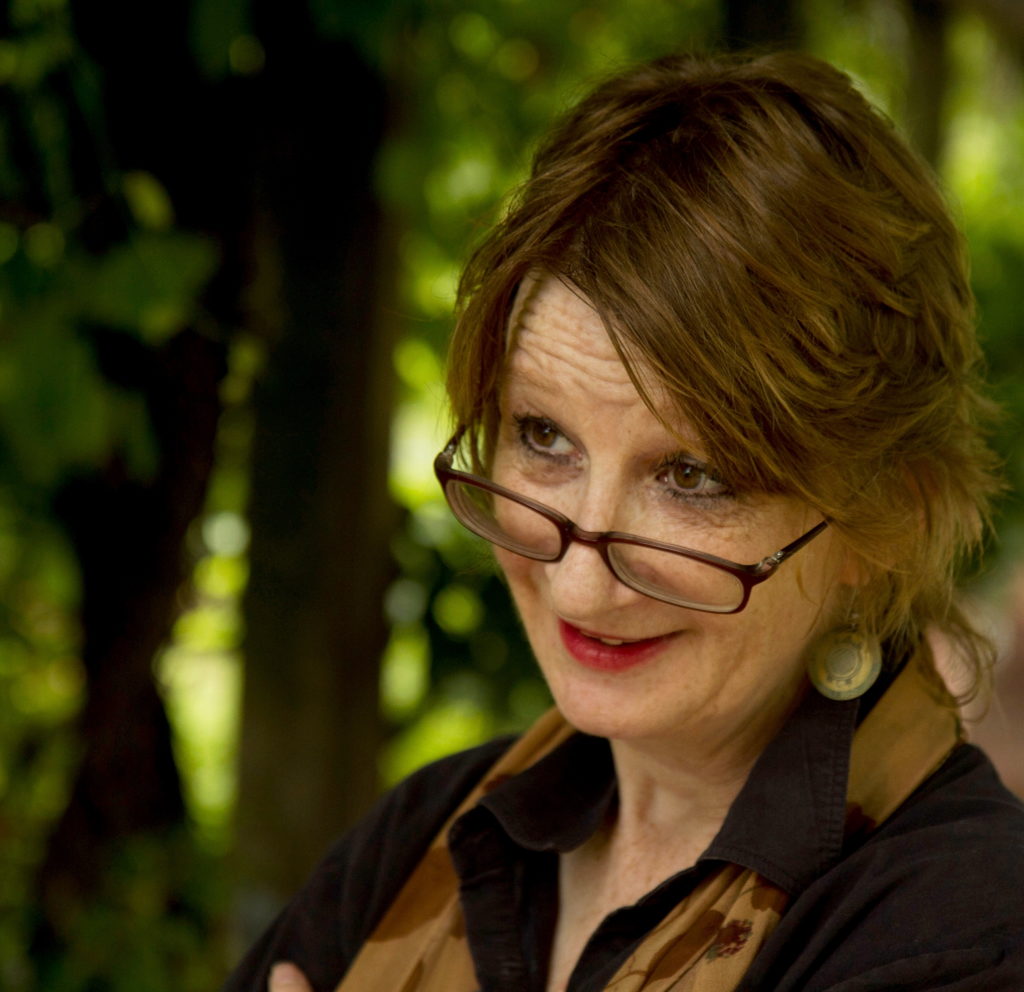
DC-based Texas writer Elizabeth Bruce’s debut novel, And Silent Left the Place—which is being re-issued in 2021-–won Washington Writers’ Publishing House’s Fiction Award and distinctions from ForeWord Magazine and the Texas Institute of Letters. Bruce has published prose in journals in the USA, UK, Canada, Australia, New Zealand, Malawi, India, Yemen, and The Philippines, as well as in anthologies by Paycock Press, Weasel Press, Vine Leaves Literary Journal,and Washington Writers’ Publishing House’s This Is What America Looks Like. Her educational book, CentroNía’s Theatrical Journey Playbook: Introducing Science to Early Learners through Guided Pretend Play, garnered distinctions from four indie book contests. She’s been awarded several fellowships from the DC Commission on the Arts & Humanities and the McCarthey Dressman Education Foundation, and has workshopped fiction with Richard Bausch, the late Lee K. Abbott, Janet Peery, John McNally, and Liam Callanan.
An excerpt from Elizabeth Bruce’s award-winning novel And Silent Left the Place..Chapter 5:
CALDER’S DOG
A dog whimpered. Riley groaned and shifted in his arm-chair by the window. At first he thought it was another dream. Another creature come to him in sleep the way they did, cooing or crying or cackling like jaybirds.
He lifted his head and waited for the sound to come again. It did. A squeaky, far-off sound like a circus clown twisting red balloons. Round and round the sound went making what kind of shape Riley couldn’t say.
He roused himself up out of the chair. Calder’s dog was at the front door. Riley knew it right away. They were friends, Riley and this dog. Both walkers down a path few trod.
A young dog with fur the color of marshmallows toasted gold.
A pretty dog, but blind. Blind like no dog Riley’d ever known. Like no other being really, man or beast. Calder’s dog had two large glassy eyes, pupil-less like jumbo jaw- breakers sucked down to a pure silver blue.
Cataracts. The dog was born with cataracts.
Well I’ll be durned, Riley’d thought the first time he’d seen her as a pup. Would you look at that.
She was always happy, though, this animal. Always wag- ging her tail.
Riley looked through the gas station’s front door. The dog smelled him and stopped whimpering. What are you doing out here by yourself, girl? he thought, Where’s Calder?
Riley opened the door and the dog came in. She looked toward him, her eyes beholden, blind though they were. She sniffed her way to Riley’s hand and licked it. Her tail wagged as it always did, moving the whole back of her body with it.
Riley really liked this dog. She alone among creatures who came his way, on two legs or on four, understood him. Without words. Or seeing. Just a deep knowing, Riley and that dog had. It was something they’d had since Calder had first held the dog up to Riley as a pup.
“What do you think I should do with her, Riley?” Calder had asked years ago. “Fellers say drown her, but something in me says no. This here’s a good dog underneath them ghost eyes she’s got. Figure you might know about these things, Riley. Bet a feller like you’s seen a lot of ghosts in your time. What do you say, should I keep her?”
Riley had looked up at Calder, moved by the rich man’s question. Calder wasn’t much given to asking for advice and surely not from Riley. He’d nodded his head a time or two, Riley had, then given a couple more quick nods to make sure Calder understood him.
“Good choice, friend,” Calder’d said and smiled. Riley remembered being happy at that moment.
Calder squinted. His bottom jaw stuck out. “Think I’ll call her Lorraine,” he said, and Riley was struck stone. “That was your daughter’s name, wasn’t it, Riley?” Calder said “The one who died?”
Riley opened his mouth to cry out in pain but nothing came. Nobody’d spoken of his dead baby girl for going on thirty years, not to his face at least, not since Dolores left.
LORRAINE had only been a few weeks old.
“Overlaying,” they called it, though Dolores swore nobody’d rolled over on her, their miracle child. “God just took her, that was all,” Dolores said, “took her up to heaven he did. Called her back. Wasn’t her time, Tom,” that’s what Dolores said. “World’s not good enough for her yet. Too much evil, God figured, for pure goodness like her. She’s at peace now, Thomas, swimming in His love. It’s a better place, Tom, a better place than here. Someday we’ll see her, husband. Someday we’ll know her again. Don’t cry, Tom,” Dolores said. “Don’t cry, honey. Maybe we’ll have another baby someday. Maybe God will send us another lit- tle girl. Don’t cry, sweetheart, don’t cry. Everything’s going be all right.”
Riley held his hands out to Calder that day and Calder handed him the pup. Riley held her up to his cheek. The dog’s soft puppy fur rubbed against his stubble. The animal sniffed around and pushed her wet black nose into Riley’s skin, licking the salty wetness she found there, rolling down his cheeks.
Riley stood there and let the dog have her way with his face.
“Well, time to go old man,” Calder said, taking back the dog and stuffing it into a knapsack he slung over his saddle horn. “Give me a pack of Dentyne for the road, friend, and thanks for the advice.”
RILEY LOOKED AROUND in the desert night for signs of Calder. The wind blew a bottle cap off the ledge by the gas pumps and rolled it over toward the door. Lorraine sat up and raised her ears. Riley looked at the crimped piece of metal, bent and rusted like he was, he thought, tossed about alone. He locked the door and led Lorraine back into his room behind the office.
“Are you hungry, girl?” he asked, speaking suddenly out loud.
Lorraine stopped, startled maybe by the sound of his voice. Riley stood dead still, his heart pounding, trying to figure out if he’d really said something aloud outside his hole. Something in him cracked, something hard and cold, and he stopped breathing for a moment.
Lorraine looked toward Riley and wagged her tail.
Riley shook himself and rubbed the dog behind the ears. He pried open his old Frigidaire and took out two hot- dogs and some cooked oatmeal.
“Here you go, little gal,” Riley said softly aloud again, and the words rumbled inside him. “This is for you. This is for Miss Lorraine.”
©Elizabeth Bruce 2021
WWPH Community News
WWPH WRITES THE HOLIDAYS CONTEST
Submit your work inspired by our prompts! One DMV poet and fiction will win $100 and publication in WWPH Writes on December 24, 2021. WWPH Writes editors, Caroline Bock and Jona Colson, will judge with Kathleen Wheaton, the president of WWPH. FREE to submit. Deadline for the contest: November 22nd.
Poetry Prompt: A Mind of Winter
As Wallace Stevens writes in “The Snowman,” “one must have a mind of winter.” What’s in your winter mind? The solstice? A holiday? Decorations? Or something more mysterious and darker. What hesitations do you have about winter? What conflicts? What desires? Let us read them and consider them for our WWPH Writes Holiday edition.
Fiction Prompt: A Gift
The O. Henry classic, “The Gift of the Magi,” is the tightly-written, unforgettable story of Della and Jim and their unexpected gifts to one another amid a very difficult year. If you haven’t read this story, it’s worth reading, especially for the dialogue and pacing. It’s here, in the public domain. Here’s our fiction prompt: Write your 2021 version of “The Gift of the Magi.” Imagine two characters grappling with gift-giving in this unprecedented year, in 2021. End with a twist worthy of O. Henry, or even more so, worthy of you! Aim for 1,000 words or less. Submit here.
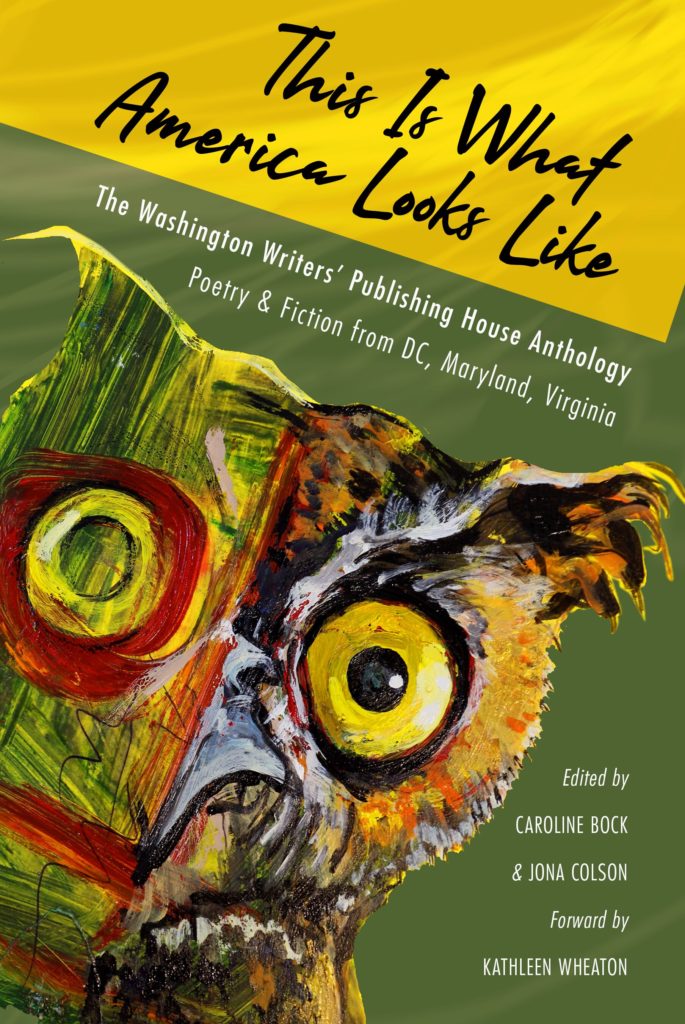
HOLIDAY BOOK SALE AT WWPH BOOKSTORE! USE THE PROMO CODE holidaywrites for 10% off all titles…only until December 6th. Order now for your books to arrive by the holidays!
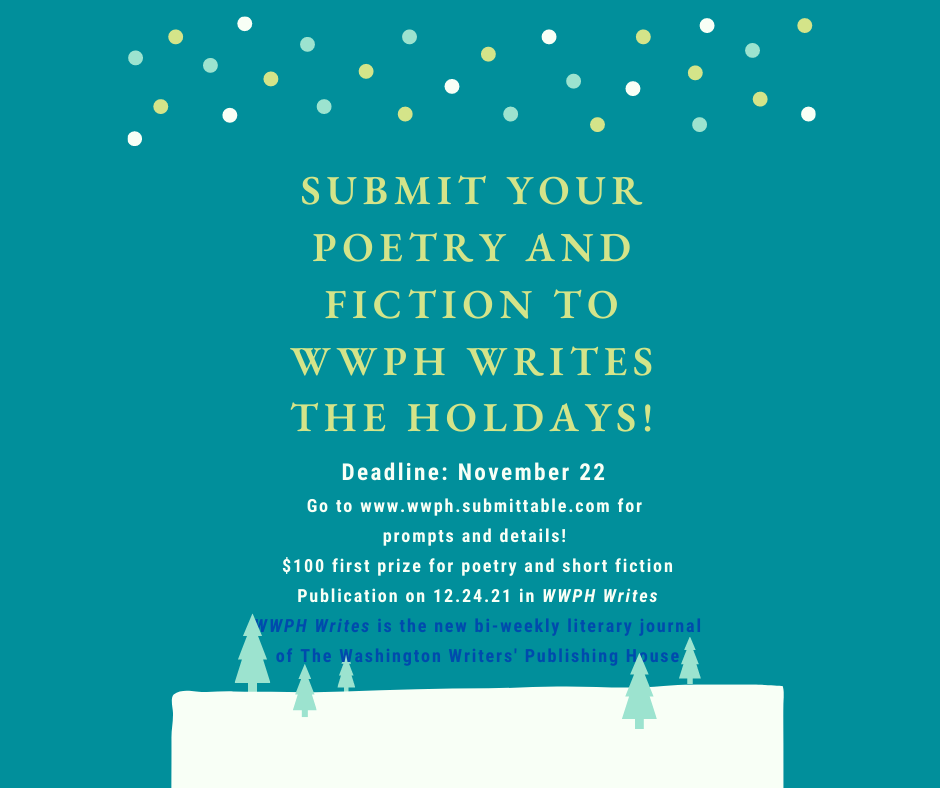
Thinking of submitting to WWPH Writes? We are looking for poetry and fiction that celebrate, unsettle, and question our lives in the DC, Maryland, and Virginia area (DMV) and in our nation. We seek work that is lyrical and dynamic, and we believe in cultivating a diverse environment of content, form, risk, and experimentation. New perspectives and voices with craft and fierceness are strongly encouraged to submit. Send us your best work–challenge us with your ideas and your writing. We look forward to reading your poems and stories! Submit here.
WWPH Writes is the bi-weekly literary journal of The Washington Writers’ Publishing House, a nonprofit, 501c3, all-volunteer, cooperative press. You can now easily donate to WWPH and help us support and celebrate DMV writers via our new donation page. Interested in a legacy? We are looking for a sponsor to ‘name’ our annual Fiction Award. Please email us at wwphpress@gmail.com, if you are interested. Most of all, thank you for reading and being part of the WWPH community!

Caroline Bock
Fiction Editor, WWPH Writes

Jona Colson
Poetry Editor, WWPH Writes
